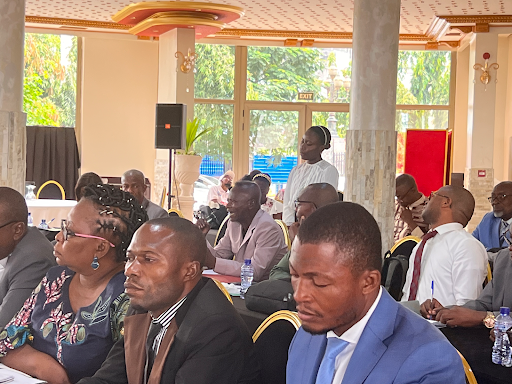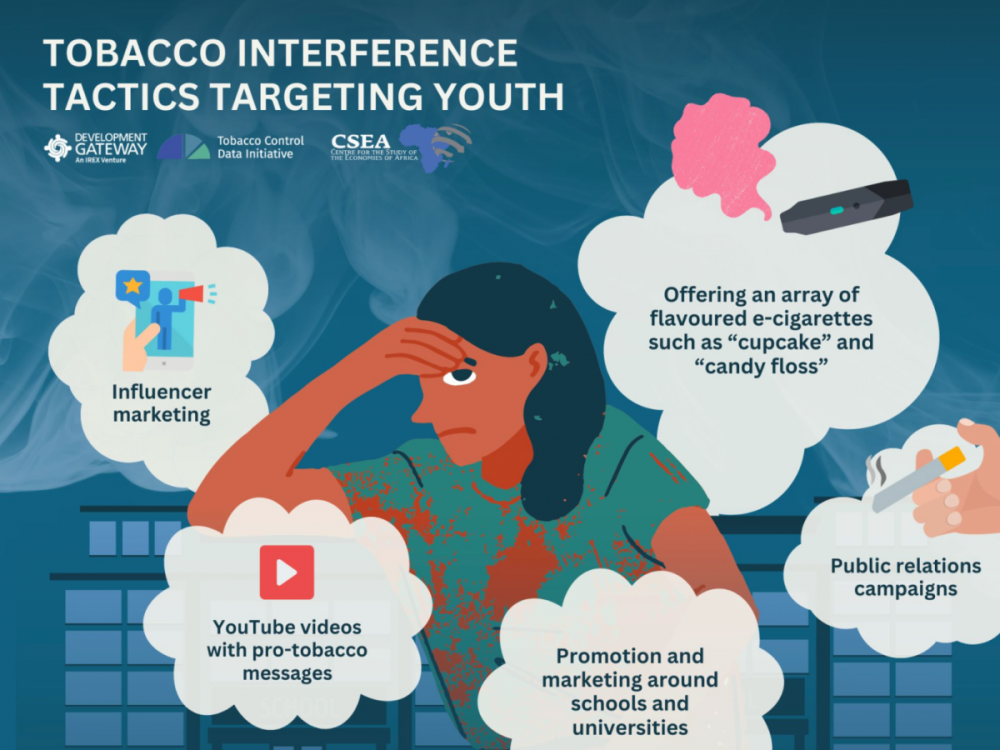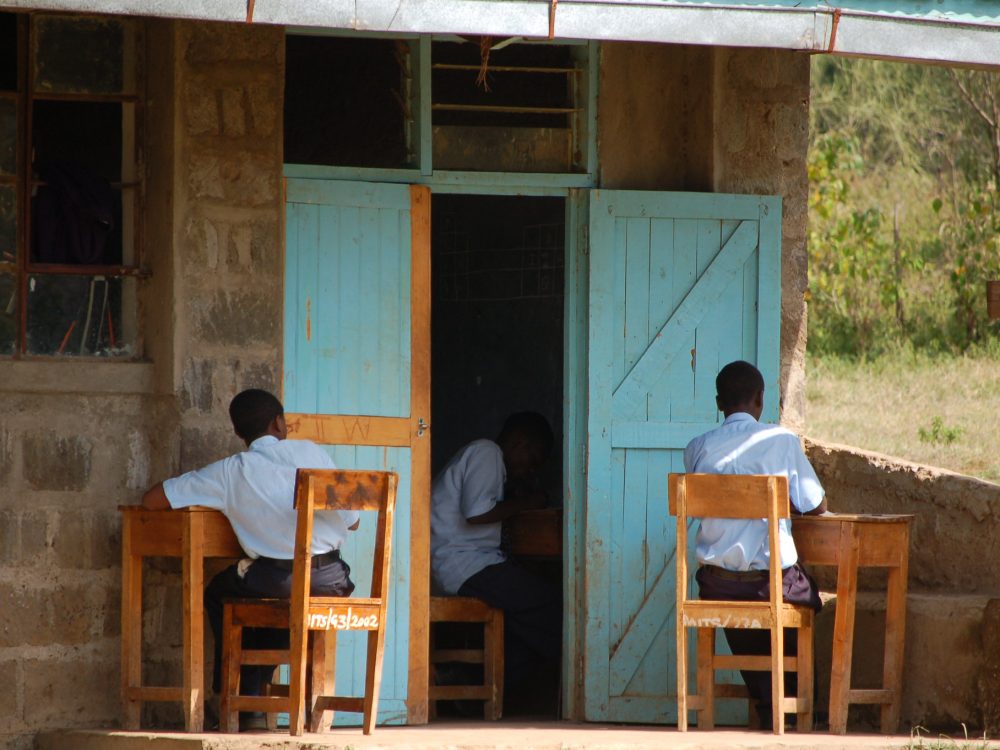Advancing Tobacco Control in Ethiopia: The TCDI Website
Beginning in 2021, Development Gateway: An IREX Venture (DG) started creating the Tobacco Control Data Initiative (TCDI) Ethiopia website (ethiopia.tobaccocontroldata.org) in partnership with Ethiopian Food and Drug Authority (EFDA). Launching in Addis Ababa, Ethiopia on February 28, the website is a “one-stop shop” to access the relevant data that Ethiopia’s policymakers need to advance tobacco control legislation and is one of several country-specific platforms DG designed in collaboration with University of Cape Town’s Research Unit on the Economics of Excisable Products (REEP).
In addition to Ethiopia’s website, TCDI country websites exist for South Africa, Zambia, Nigeria and will soon launch for Kenya and the Democratic Republic of the Congo; all were developed as part of the TCDI Program that DG implements and which is supported in partnership with the Bill & Melinda Gates Foundation.
Each country-specific TCDI website addresses barriers to data use in tobacco control by consolidating available and trusted tobacco control data, identifying and filling data gaps, and creating an online resource for policymakers to access the relevant data needed to pass and monitor tobacco control legislation. Specifically, the TCDI Ethiopia website was created in response to the impending threat of tobacco use in Ethiopia and the various dangers that accompany it.
Why TCDI?
Tobacco use in Ethiopia is relatively low compared to nearby countries; however, 259 men and 65 women in Ethiopia die per week as a result of tobacco-related issues, totaling 16,800 people per year (Naghavi, M, et al. 2017). While tobacco consumption is decreasing throughout the world, the largest increase of smokers is expected to occur in Africa (Africa’s Tobacco Epidemic, TobaccoTactics, 2021). This is particularly alarming in Ethiopia because: cigarettes are still affordable; in general, incomes are rising in Africa; the country has a large youth population; and interference by the tobacco industry in adoption and implementation of tobacco control policies is present in Ethiopia. There is also limited awareness around the negative effects of tobacco use, and approximately 3.4 million Ethiopians over the age of 15 use tobacco products (2016 Global Adult Tobacco Survey). Although Ethiopia has one of the strongest tobacco control laws in Africa, it needs to be consistently enforced. Therefore, increased awareness of tobacco harm as well as consistent enforcement of tobacco control policies are needed to ensure that smoking rates do not increase.
Through their research, the TCDI team identified common themes in the data landscape. These relate to concerns about the enforcement of existing tobacco control laws; data gaps relating to illicit trade in tobacco products; the economic and health burden of tobacco use; the prevalence of tobacco use; tobacco agriculture; and tobacco taxation. As a result, the TCDI team understands the data needs and gaps, has identified existing data, and developed the TCDI Ethiopia website that enables decision-makers to use essential data to inform tobacco control policy more effectively.
The TCDI Ethiopia Website
The TCDI Ethiopia website (ethiopia.tobaccocontroldata.org) equips stakeholders in government, civil society, academia, and the general public with the most recent reliable evidence to promote tobacco control and public health. It draws on both primary and secondary data sources and presents tobacco control information in user-friendly formats such as graphs, infographics, myths and facts, and success stories. The website will feature seven themes: tobacco prevalence, tobacco harm, illicit trade, taxation, industry interference, enforcement of tobacco control laws, and tobacco cessation. The website will be updated with new information as this becomes available over the course of the program.
Collecting Primary Data
Out of these seven themes, the page on enforcement of tobacco control laws will mainly be based on primary data. In December 2022, an observational study led by the Addis Ababa University School of Public Health was carried out to evaluate compliance with Tobacco Advertising Promotion and Sponsorship (TAPS) bans at point-of-sale and smoke-free regulations in hospitality establishments in 10 Ethiopian cities (Addis Ababa, Adama, Assosa, Bahir Dar, Dire Dawa, Gambella, Harar, Hawassa, Jigjiga, and Semera). Using standardized data collection tools, trained data collectors observed 1,468 points-of-sale (i.e., supermarkets, khat shops, merchandise stores, minimarkets, regular shops, permanent kiosks, street vendors, and food and drink wholesalers) and 1,378 hospitality venues (i.e., hotels, restaurants, bars, bars and restaurants, café and restaurants, butcher houses and restaurants, groceries, and nightclubs/lounges). Moreover, the concentrations of PM 2.5 in 144 hospitality venues in Addis Ababa were assessed to measure the air quality. In order to examine the facilitators and barriers to implementation of the tobacco control legislation, 41 in-depth interviews with relevant tobacco control stakeholders who work on policy-making and/or program implementation at the national and/or sub-national levels were also undertaken.
The study team is currently working on data analysis and report writing, the findings will be disseminated in March 2023 and incorporated into the dashboard in due course. The results of this study will give decision-makers information about the level of compliance with tobacco control measures. The findings of this study will also be used by the Ethiopian Government to improve implementation and enforcement of tobacco control laws.
The Development Process
Before creating the TCDI Ethiopia website, the TCDI team assessed the existing data and stakeholder needs through hour-long interviews with key members of the tobacco control community. The learnings from the assessment were validated with stakeholders during a workshop on June 4, 2021 before technical development proceeded. The website was created through an agile, co-design process in close consultation with key tobacco control stakeholders in Ethiopia, including Ethiopian Food and Drug Authority. (Find the full list of our stakeholders and partners here.) Initial mockups and website designs were shared with stakeholders for their input and suggestions. As a final step before launching the site, user feedback sessions were led in November 2022 and January 2023.
Ethiopian Food and Drug Authority
Ethiopian Food and Drug Authority (EFDA) is a public organization responsible for protecting and promoting public health by ensuring the quality, safety, effectiveness, and proper use of regulated products through licensing, inspection, registration, laboratory testing, post-marketing surveillance, community participation, and provision of up-to-date regulatory information. It is an autonomous federal government office, established by Ethiopia’s House of Peoples’ Representative through proclamation no. 1263/2021 with its head office in Addis Ababa.
EFDA is accountable to the Ministry of Health. It is responsible for regulating the manufacture, import, export, distribution, use, content, information disclosure, packaging and labeling with health warnings, advertisement, promotion, and sponsorship of tobacco products. It is also legally mandated as a focal office for coordination of the multi-sectoral implementation of the Framework Convention on Tobacco Control (FCTC) by different stakeholders through the development and mainstreaming of a multi-sectoral strategic plan, including implementation, monitoring, and evaluation jointly with different stakeholders. It also serves as an information center for tobacco-related information needs. EFDA generates and collects evidence on grave consequences of tobacco use as well as implementation and impact of interventions on tobacco control. More at www.efda.gov.et.
Development Gateway: An IREX Venture (DG)
Development Gateway: An IREX Venture provides data and digital solutions for international development. DG creates tools that help institutions collect and analyze information; strengthen the institutional capacity to use data; and explore what processes are needed to enable evidence-based decisions. A mission-driven nonprofit since 2000 with staff based in five global hubs and around the world, DG supports the use of data, technology, and evidence to create more effective, open, and engaging institutions. More at www.developmentgateway.org.
Share
Related Posts

The Cancer-Tobacco Link: Using Data to Drive Stronger Tobacco Control Policies
As we observe World Cancer Day today, it is crucial to recognize the significant role smoking plays in the global cancer epidemic. Tobacco use is the leading preventable cause of cancer and cancer-related deaths worldwide, necessitating a dynamic, multidisciplinary approach to tobacco control interventions. DG’s Tobacco Control Data Initiative (TCDI) contains country-specific websites designed to

Stakeholder, Where Art Thou?: Three Insights on Using Governance Structures to Foster Stakeholder Engagement
Through our Tobacco Control Data Initiative (TCDI) program and its sister program Data on Youth and Tobacco in Africa (DaYTA), we have learned that creating governance structures, such as advisory boards or steering committees, is one approach to ensuring that digital solutions appropriately meet stakeholders’ needs and foster future stakeholder engagement. In this blog, we explore three insights on how governance structures can advance buy-in with individual stakeholders while connecting them to one another.

Raising Awareness on World No Tobacco Day 2024: DaYTA/TCDI’s Work on Tobacco Industry Interference
As tobacco companies have aggressively deployed creative strategies to market retail nicotine and tobacco products at children and adolescents, it is imperative that tobacco control stakeholders have access to timely and high-quality data to inform robust policies, regulations, and enforcement mechanisms.
“Data…for What?!:” Expanding into Education, Media/Disinformation & Youth
In Episode 2 of Data…for What?!, a podcast series from Development Gateway: an IREX Venture (DG) which explores our new strategic plan, Josh Powell met with experts from DG and IREX to discuss DG’s expansion into the education, media and disinformation, and youth sectors. The conversations explore the most pressing challenges and greatest opportunities for data and technology to positively impact these sectors and discuss how these trends are likely to play out in the years ahead. Based on these trends, the experts explain the unique fit for DG’s skills and specific opportunities for collaboration that align with the vision of DG’s partnership with IREX, which has a long and successful history working in each sector.
Education
Josh explored the education landscape with DG’s Aminata Camara Badji, who is the Senegal-based Regional Program Lead in West Africa, and IREX’s Becky Ward, who is a UK-based Senior Technical Advisor for education in Africa, Europe/Eurasia, Middle East, and North Africa.
Opportunity: Understanding Stakeholder Needs
One of DG’s main opportunities in expanding into education is to create strong ties with stakeholders, as DG has done in previous projects. According to Aminata, DG always prioritizes ensuring that stakeholders are meaningfully engaged “from the outset” of a project through finalization.
Next Steps: Ground-up Versus Global
Becky highlighted that the time is ripe for DG to join the education landscape, because an appetite for data-driven decision-making exists within the sector. Stakeholders generally recognize the importance of evidence-based policies that are responsive to identified needs. However, many challenges still need to be addressed in order to implement a data-informed approach to policy-making.
According to Becky, one big challenge with data in the education sector is finding ways to reconcile data collected at the global level that is often subject to rigorous methodological checks with more localized data that is subject to less rigorous methodology, but potentially more useful at the local level. “I think there really is space for advocacy for that kind of ground-up approach to collecting data,” said Becky in reference to this challenge.
Helping balance local needs with policymakers’ needs is work Aminata is also eager to do. “I’m really excited to see how we can work together, implement projects … and also make sure that all our projects will be able to be applied at the community level.” Becky agreed, noting that she is excited for the “holistic approach that is not just about developing the technology infrastructure and the protocols, but primarily about the people who use the systems.”
Media and Disinformation
Josh explored the many challenges and opportunities to combat disinformation—at the national and regional levels—during the conversation with DG’s Annie Kilroy, who is a Senior Associate based in Washington, D.C., and IREX’s Tetiana Karas, who was a Senior Program Manager based in Kyiv, Ukraine.
Opportunity: Combating Disinformation
Disinformation continues to rapidly spread in media throughout the world. In part, this is due to the lack of journalistic standards and ethics as well as legislative oversight of social media platforms—which are often subject to disinformation campaigns, according to Tetiana. Additionally, this challenge is compounded by the widespread presence of traditional media outlets promoting certain political agendas. For example, Tetiana cited a study conducted in Ukraine which showed that people were more likely to support the invasion of Ukraine if they consumed information from pro-Russian media outlets.
Annie agreed and noted that another huge issue is social media apps themselves. On social media platforms, “the algorithms and the advertisements and the suggested links … progressively get you to more and more extreme content,” said Annie.
Next Steps: Balancing Accountability, Power, and Consumer Literacy
Both the issue of how social media algorithms work and the lack of oversight show the need for accountability systems either within the platforms themselves and/or externally through governments or civil society organizations.
According to Tetiana the design of these accountability mechanisms must function independently of those who run them—and their agendas. In other words, checks must be established for systems controlling disinformation to prevent abuse of power and wrongful censure.
Both Annie and Tetiana agreed that in addition to top-down mechanisms for combatting disinformation, consumers must be better equipped to identify disinformation through improved digital and media literacy. Tetiana said that interesting next steps for DG and IREX would be to develop these sorts of “information campaigns” and “effective interventions.”
Youth
In the final conversation, Josh spoke with DG’s Principal Consultant and West Africa Regional Manager Vanessa Baudin Sanchez, who is based in Dakar, Senegal, and Nina Oduro, who was IREX’s Senior Advisor for Youth and Leadership.
Opportunity: Engaging Youth
In the youth sector, two opportunities that Vanessa and Nina identified are 1) getting youth involved in advocacy and 2) overcoming accessibility barriers that prevent youth from using digital tools.
Vanessa sees that there is often a gap between young people knowing about global and local issues and taking positive action in response to these issues. “Everything digital and technology can be used to be able to fill in that gap and tell [youth]…’Well, we can help, and we can help you set some goals and achieve some of those goals.’” said Vanessa.
According to Nina, any organization with a mission to support youth needs to have frameworks and support systems in place to ensure that youth have access to the digital technology they need. She noted that much can still be done without a digital device. Youth, according to Nina, “may receive information from someone that got information from a digital device,” which can allow young people to leverage information to improve their lives even if they do not have the digital device offering this information.
Vanessa had similar concerns regarding accessibility. She often wonders what happens to technology and digital tools given to young people after a development initiative is finished. “When we give equipment to those young people and we’re trying to have them use technology and data to improve—whether it’s lifestyle or with their condition and whatever—I think the capacity building component should also include a capacity component on digital innovation,” said Vanessa, who also noted that trainings on data privacy and security need to be offered to protect the young people using these tools.
Next Steps: Empower Youth Today
The DG/IREX partnership will allow both organizations to work closely with and empower youth in more meaningful ways.
Vanessa says she is excited for close collaborative work with IREX in the youth sector. Specifically, Vanessa is eager to do work with IREX that shows young people that “they can indeed make a difference and that we can help.”
Share
Recent Posts

Shared Struggles, Shared Solutions: Education and Cross-Sector Data Use Insights
This blog draws on DG’s experience in climate, health, aid management, and agriculture to explore connections between the challenges of data collection, data hosting, and data governance across different sectors and what the solutions to overcoming them can teach us about strengthening education data systems.

Economic Toll of Tobacco-Related Diseases in Kenya: New Research Findings
Development Gateway: An IREX Venture (DG) is pleased to announce the publication of a research manuscript on the Economic Costs of Tobacco-Related Illnesses in Kenya. This research was carried out as part of the Tobacco Control Data Initiative (TCDI) activities in Kenya and is part of a broader report on Morbidity and Mortality from Tobacco Use in Kenya.

The Data Crisis Following USAID’s Withdrawal: Opportunities to Reimagine Data Systems
For decades, USAID and other US government funding supported global data systems, from health surveys and early warning tools to digital infrastructure for ministries. The abrupt termination of USAID funding has triggered twin crises: a halt to data collection and the undermining of digital systems – reveal existing inefficiencies and instabilities in how data is collected, managed, and shared both within and between countries.





